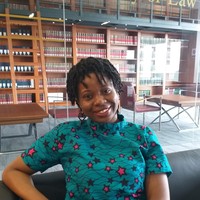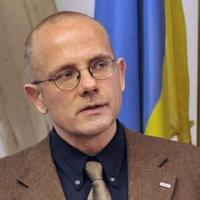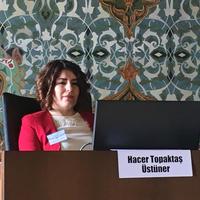
Miracle C Uche
I work in the field of public international law with particular focus on international criminal law. I worked in a team that developed and implemented refugee’s and communities’ socio-cultural integration projects in Nigeria through Stichting Unity in Diversity, and we are currently working on new humanitarian projects in Nigeria with particular focus on sustainable education, health, and environmental practices.
I currently teach criminal law and tort law. I taught EU law (University of Essex, and the Institute of Law, Jersey), criminal law (Institute of Law, Jersey and the University of Essex International College), international criminal and humanitarian law at the Institute of Law, Jersey. I value Socratic and collaborative approaches to teaching and learning as tools which engender responsibility and ownership in the learning process, and encourage students’ active engagement, and critical thinking.
Research interests
International Criminal Law and Transitional Justice
I have been researching different aspects of justice for victims and their participation in the investigation and prosecution of war crimes, crimes against humanity, genocide, and aggression at the international, and national levels. I examine capacity building of states to prosecute these crimes, and innovative, transformative, and sustainable reparations for victims as part of criminal justice and wider transitional justice processes.
My PhD thesis explored the reinterpretation of the International Criminal Court (ICC’s) principle of complementarity as a tool which can aid the ICC in the pursuit and achievement of victim-oriented justice for victims before the ICC, while encouraging States Parties to the ICC to do the same in their national and regional jurisdictions. The thesis proposed a structural change at the ICC based on its existing Rome Statute framework and argues that such a change is necessary not only for ensuring that justice can be victim-oriented, but to encourage more states to join the ICC in fighting impunity for war crimes, crimes against humanity, genocide, and aggression.
Public International Law, Diplomacy and Humanitarian Studies
I have conducted desk and field research on refugees' and communities’ integration and have collaborated with those who work in the diplomatic sector to implement humanitarian projects which are outcomes of my research. I am interested in peace and conflict resolution studies and projects, and in international relations and diplomacy. Researching and working on projects in these areas have widened my understanding and approach to justice for victims and my research has in turn influenced my approach to humanitarian projects. I am currently exploring the role and importance of sustainability in my areas of research interest and in the humanitarian projects I am involved with.
Address: Cornwall, UK
I currently teach criminal law and tort law. I taught EU law (University of Essex, and the Institute of Law, Jersey), criminal law (Institute of Law, Jersey and the University of Essex International College), international criminal and humanitarian law at the Institute of Law, Jersey. I value Socratic and collaborative approaches to teaching and learning as tools which engender responsibility and ownership in the learning process, and encourage students’ active engagement, and critical thinking.
Research interests
International Criminal Law and Transitional Justice
I have been researching different aspects of justice for victims and their participation in the investigation and prosecution of war crimes, crimes against humanity, genocide, and aggression at the international, and national levels. I examine capacity building of states to prosecute these crimes, and innovative, transformative, and sustainable reparations for victims as part of criminal justice and wider transitional justice processes.
My PhD thesis explored the reinterpretation of the International Criminal Court (ICC’s) principle of complementarity as a tool which can aid the ICC in the pursuit and achievement of victim-oriented justice for victims before the ICC, while encouraging States Parties to the ICC to do the same in their national and regional jurisdictions. The thesis proposed a structural change at the ICC based on its existing Rome Statute framework and argues that such a change is necessary not only for ensuring that justice can be victim-oriented, but to encourage more states to join the ICC in fighting impunity for war crimes, crimes against humanity, genocide, and aggression.
Public International Law, Diplomacy and Humanitarian Studies
I have conducted desk and field research on refugees' and communities’ integration and have collaborated with those who work in the diplomatic sector to implement humanitarian projects which are outcomes of my research. I am interested in peace and conflict resolution studies and projects, and in international relations and diplomacy. Researching and working on projects in these areas have widened my understanding and approach to justice for victims and my research has in turn influenced my approach to humanitarian projects. I am currently exploring the role and importance of sustainability in my areas of research interest and in the humanitarian projects I am involved with.
Address: Cornwall, UK
less
Related Authors
Bill Bowring
Birkbeck College, University of London
Andreas Umland
National University of "Kyiv-Mohyla Academy"
emilio santoro
Università degli Studi di Firenze (University of Florence)
Armando Marques-Guedes
UNL - New University of Lisbon
Alexis Galán
Rheinische Friedrich-Wilhelms-Universität Bonn
Hacer Topaktas Ustuner
Istanbul University
Noe Cornago
University of the Basque Country, Euskal Herriko Unibertsitatea
Heath Cabot
University of Bergen
Roman Petrov
National University of "Kyiv-Mohyla Academy"
Giulio Itzcovich
Brescia University
InterestsView All (8)










Uploads
Drafts by Miracle C Uche
For Europe however, the local integration of refugees has become the new challenge.(For europe, integrating refugees is the next big challenge.2016) A number of reasons underscore this challenge. The forerunner of them being the difficulty in defining such a concept that has both legal and social dimensions, and therefore understanding how encompassing it should be.(Ager & Strang, 2008). Besides the definition challenge, “lack of early community preparation and involvement”, as well the structure of integration policies which focuses mainly on refugees’ economic integration, and which places the burden to integrate mainly, (if not only) on refugees (what I refer to as a one-sided approach) all contribute to obstacles in local integration in Europe. The consequential shortcomings of this approach to local integration, have made it increasingly crucial to re-evaluate related practices and policies for the sake of the sustainability of an inevitably more diverse host society, and to prevent the perpetuation of division among communities. A two-sided approach of a well-rounded integration program, multifaceted, involving different layers of the society, as well as the entire community is an ideal durable solution for the refugee situation facing Europe.
It is based on this premise that this paper will describe and analyze two main types of obstacles that slow down, or in many cases hinder the integration of refugees in Europe.
Papers by Miracle C Uche
For Europe however, the local integration of refugees has become the new challenge.(For europe, integrating refugees is the next big challenge.2016) A number of reasons underscore this challenge. The forerunner of them being the difficulty in defining such a concept that has both legal and social dimensions, and therefore understanding how encompassing it should be.(Ager & Strang, 2008). Besides the definition challenge, “lack of early community preparation and involvement”, as well the structure of integration policies which focuses mainly on refugees’ economic integration, and which places the burden to integrate mainly, (if not only) on refugees (what I refer to as a one-sided approach) all contribute to obstacles in local integration in Europe. The consequential shortcomings of this approach to local integration, have made it increasingly crucial to re-evaluate related practices and policies for the sake of the sustainability of an inevitably more diverse host society, and to prevent the perpetuation of division among communities. A two-sided approach of a well-rounded integration program, multifaceted, involving different layers of the society, as well as the entire community is an ideal durable solution for the refugee situation facing Europe.
It is based on this premise that this paper will describe and analyze two main types of obstacles that slow down, or in many cases hinder the integration of refugees in Europe.